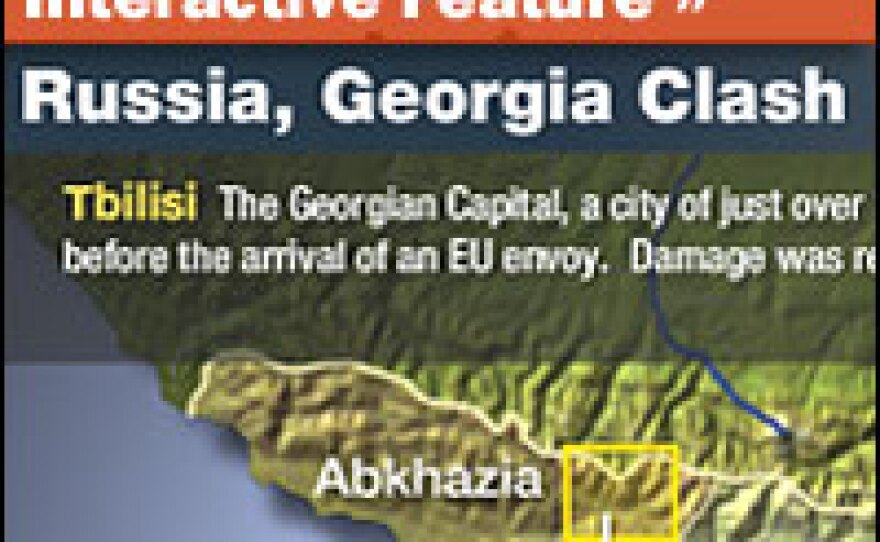Georgian President Mikhail Saakashvili declared Tuesday that Russia has no legal basis for its recognition of the independence of the breakaway Georgian provinces of South Ossetia and Abkhazia. He and other Georgian leaders fear the move will lead Russia to eventually annex the two territories.
Europe and the U.S. also rejected the move, expressing a common view that the Russian action was unacceptable.
At first there was just stunned silence in Tbilisi when word came that Russia's president had recognized the independence of South Ossetia and Abkhazia. Many in the Georgian government didn't think Dmitri Medvedev would take this step, even though the two houses of the Russian parliament called for this action yesterday.
Eventually Georgian officials began to react. One senior figure in the Foreign Ministry said the Russian action was tantamount to annexation of the disputed territories. The assumption is that as so-called independent states, South Ossetia and Abkhazia would petition to join the Russian Federation. It's a goal that leaders of South Ossetia and Abkhazia have sought for many years.
Saakashvili called a meeting of his national security council. Afterward, he went on national television and declared that the Russian action was completely illegal. "Russia was trying to destroy Georgia's government, something it couldn't do by military force," he said.
First Annexation Attempt In Decades
This is the first attempt in Europe since Nazi Germany and Stalin's Soviet Union, Saakashvili said, by a big country to destroy a neighbor and openly annex its territory and change Europe's internal boundaries.
What Georgia can do about this is unclear. Military action is out of the question, because Georgia's army all but fell apart during the recent military confrontation with Russian forces. Saakashvili appealed for Western help, as he has done throughout this crisis, insisting that it is now time for the European Union and NATO to speed the integration of Georgia.
The international community reacted swiftly to the Russian move. From Europe to the U.S. the reaction was firm and uniformly negative. Secretary of State Condoleezza Rice, traveling in the Middle East, was sharply critical of Russia. If Russia tries to gain recognition for its move at the U.N. Security Council, Rice said, the United States will stand in the way with its veto.
"Since the United States is a permanent member of the Security Council, this simply will be dead on arrival in the Security Council. And therefore in accordance with other Security Council resolutions that are still in force, Abkhazia and South Ossetia are a part of the internationally recognized borders of Georgia, and it's going to remain so," Rice said.
There were similarly critical statements from France's foreign minister, Bernard Kouchner, who condemned this decision. Similar comments came from NATO Secretary-General Jaap de Hoop Scheffer, British Foreign Secretary David Miliband and German Chancellor Angela Merkel. Merkel recently tried to act as a bridge between Russia and the rest of Europe.
"This contradicts my own and I think all our ideas," she said during a visit to Estonia, adding that the Russia action is totally unacceptable.
Despite the common front the U.S. and Europe displayed today in the face of Russia's latest move, there were no clear proposals of what could be done concretely to confront Russia or reverse its action.
That was the dilemma of the West during the short nasty military confrontation between Georgia and Russia earlier this month. And that remains the dilemma of the West with Russia's declaration of support for the independence of the two rebel enclaves.
Copyright 2022 NPR. To see more, visit https://www.npr.org. 9(MDAzMjM2NDYzMDEyMzc1Njk5NjAxNzY3OQ001))







